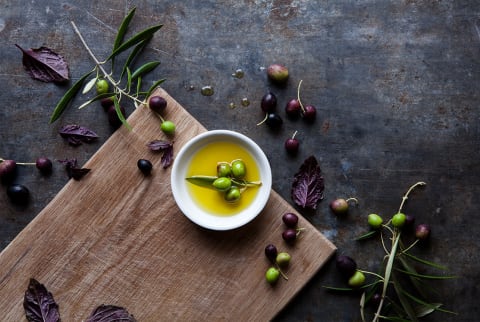Advertisement
Here's How To Know If Your Olive Oil Is 100% Pure — & Why That Matters


Odds are if you're regularly cooking meals for yourself, you're also consistently using a cooking oil of some form. And the superior option of them all? Olive oil. More specifically, extra-virgin olive oil.
When you're buying a product from the grocery store, you likely take whatever is written on the label at face value, but as integrative nutrition and health expert Courtney Swan, M.S., notes, olive oil brands aren't created equal when it comes to quality.
In fact, not all of the olive oil on the market is 100% pure. In a recent Instagram reel, Swan breaks down how to determine if your EVOO is real, and what to look for on the label when making purchases in the future.
Why your EVOO may not be 100% pure
Olive oil is generally more expensive than other options such as soybean oil or vegetable oil, so many of the options on the shelves in your grocery store may be cut with these cheaper oils to accommodate mass production.
"Seventy-five to 80% of olive oil on a shelf is actually a fraud," warns Swan. "Even if it says 100% olive oil on there, it does not necessarily mean it's going to be 100% olive oil. A lot of olive oils are now being cut with soybean oil, canola oil, safflower oil, and sunflower oil, and they're doing this to make it cheaper."
On the whole, it's best to avoid oils such as canola, safflower, and vegetable due to their highly refined nature, making it especially frustrating when you're putting in the effort to purchase EVOO and still not getting what you paid for.
How do you know you're getting pure olive oil?
So how can you be sure that your EVOO is 100% real? "Two things: When you pour out the olive oil, you want it to be really deep green so you can tell by the color," explains Swan. "And then when you taste it, it's going to taste really peppery."
While it's still important for the bottle to read "100% olive oil," you may not be able to take every brand at its word, so if you're dedicated to getting a pure olive oil, you should do some extra research before making your purchase. In her demonstration, Swan uses Brightland olive oil as a great option that is 100% pure.
The takeaway
A good cooking oil not only affects the flavor of your meals, but it can also contribute to your well-being over the years.
EVOO is packed with healthy fats, antioxidants, and vitamins while being significantly less processed, so you will benefit from doing the research into a quality oil that actually supports your health and isn't cut with gut-irritating, lower-quality oils. And if you need help finding one, we've rounded up 10 of the best olive oils.

Why Nutrition Is Key To Changing Your Relationship With Alcohol
Brooke Scheller, DCN, CNS

Why Alcohol Sabotages Your Gut Health & How To Get Back On Track
Brooke Scheller, DCN, CNS

Why Nutrition Is Key To Changing Your Relationship With Alcohol
Brooke Scheller, DCN, CNS

Why Alcohol Sabotages Your Gut Health & How To Get Back On Track
Brooke Scheller, DCN, CNS

Why Nutrition Is Key To Changing Your Relationship With Alcohol
Brooke Scheller, DCN, CNS

Why Alcohol Sabotages Your Gut Health & How To Get Back On Track
Brooke Scheller, DCN, CNS

Why Nutrition Is Key To Changing Your Relationship With Alcohol
Brooke Scheller, DCN, CNS

Why Alcohol Sabotages Your Gut Health & How To Get Back On Track
Brooke Scheller, DCN, CNS















